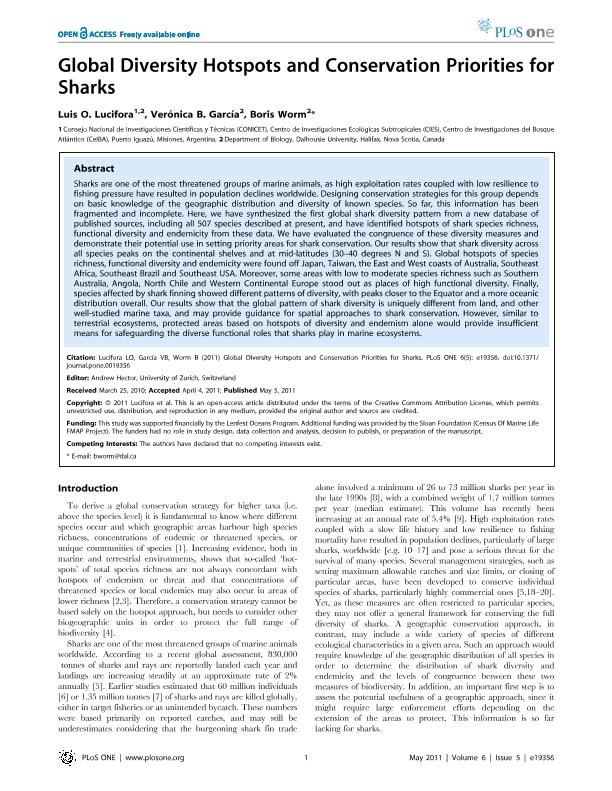Artículo
Global Diversity Hotspots and Conservation Priorities for Sharks
Fecha de publicación:
05/2011
Editorial:
Public Library of Science
Revista:
Plos One
ISSN:
1932-6203
Idioma:
Inglés
Tipo de recurso:
Artículo publicado
Clasificación temática:
Resumen
Sharks are one of the most threatened groups of marine animals, as high exploitation rates coupled with low resilience to fishing pressure have resulted in population declines worldwide. Designing conservation strategies for this group depends on basic knowledge of the geographic distribution and diversity of known species. So far, this information has been fragmented and incomplete. Here, we have synthesized the first global shark diversity pattern from a new database of published sources, including all 507 species described at present, and have identified hotspots of shark species richness, functional diversity and endemicity from these data. We have evaluated the congruence of these diversity measures and demonstrate their potential use in setting priority areas for shark conservation. Our results show that shark diversity across all species peaks on the continental shelves and at mid-latitudes (30-40 degrees N and S). Global hotspots of species richness, functional diversity and endemicity were found off Japan, Taiwan, the East and West coasts of Australia, Southeast Africa, Southeast Brazil and Southeast USA. Moreover, some areas with low to moderate species richness such as Southern Australia, Angola, North Chile and Western Continental Europe stood out as places of high functional diversity. Finally, species affected by shark finning showed different patterns of diversity, with peaks closer to the Equator and a more oceanic distribution overall. Our results show that the global pattern of shark diversity is uniquely different from land, and other well-studied marine taxa, and may provide guidance for spatial approaches to shark conservation. However, similar to terrestrial ecosystems, protected areas based on hotspots of diversity and endemism alone would provide insufficient means for safeguarding the diverse functional roles that sharks play in marine ecosystems.
Palabras clave:
Elasmobranch
,
Conservation
,
Diversity
,
Protected Areas
Archivos asociados
Licencia
Identificadores
Colecciones
Articulos(CCT - NORDESTE)
Articulos de CTRO.CIENTIFICO TECNOL.CONICET - NORDESTE
Articulos de CTRO.CIENTIFICO TECNOL.CONICET - NORDESTE
Citación
Lucifora, Luis Omar; García, Verónica Beatriz; Worm, Boris; Global Diversity Hotspots and Conservation Priorities for Sharks; Public Library of Science; Plos One; 6; 5; 5-2011; 1-7
Compartir
Altmétricas




